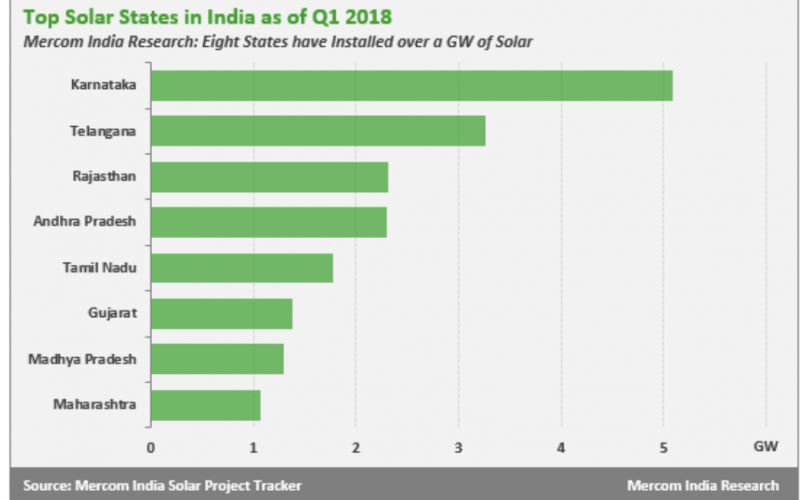Karnataka’s solar photovoltaic (PV) capacity crossed the 5 GW mark in the first quarter of 2018 to transform it into India’s top solar PV state.
So far in 2018, Karnataka has maintained its brisk pace of solar project commissioning. In 2017, the state installed over 2 GW of solar PV capacity and, in the first three months of 2018 alone, the state matched that annual total with the installation of over 2 GW of solar PV projects.
The development comes just two years after Mercom’s India Solar Project Tracker found in 2016 that Karnataka had the country’s largest project pipeline, boasting 3.4 GW of projects in various stages of development.
Policy implementation and removal of hurdles by the state electricity regulatory commission, KERC, has led to a spike in the installation numbers. We are easing the process of developing solar projects in the state and the current installation numbers are a reflection of the same.”
Mercom reported that utility-scale projects accounted for 90 percent of the 9.6 GW of total solar installations added during 2017. During the period, Telangana and Karnataka each installed more than 2 GW of solar capacity.
In Karnataka where land availability is an issue, implementing agencies have gone for the taluk wise allocation of projects to avoid burdening the existing grid infrastructure and to optimally utilise available land.
Recently, over 1 GW of solar PV capacity was auctioned and awarded in Karnataka. Mercom reported that the Power Purchase Agreements (PPAs) for solar projects totalling 640 MW to be developed in various taluks of the state have now been signed.
Mercom also reported that KREDL has auctioned 550 MW of solar projects to be developed at the Pavagada Solar Park in the Tumkur district of the state.
“Karnataka has done a commendable job so far in becoming the state with most solar installations. The big question is what happens in Karnataka after the 1 GW of projects remaining in its development pipeline get completed. If power demand remains weak and solar power becomes more expensive due to tariff imposition, future activity is likely to be less robust,” said Raj Prabhu, CEO of Mercom Capital Group.
To go solar with Zunroof please fill below form


Interested in dealership for gurgaon
Please provide contact number
I am from Bangalore, what will be the price 1 kW rooftop
Hi Mr. Bharath
Please share your contact details. Or call us at 9205695690 or email us at gosolar@zunroof.com